| Believe it or not, you can beat the wintertime blues by keeping busy with Chinese vocabulary and grammar rules! You’ll soon discover that learning Chinese is not only fun and interesting, but it’s also the perfect, productive indoor activity for a cold winter’s day. Today’s topic is a winter-themed list of Chinese adjectives. 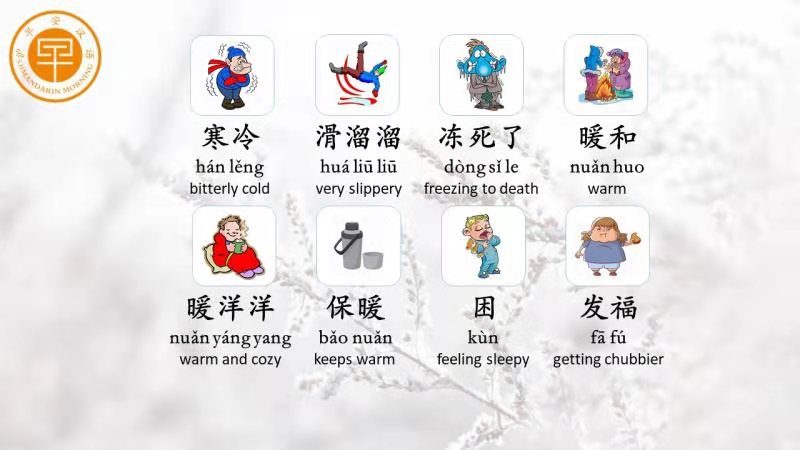 Adjectives for Chilly Weather 1. 寒冷 (hán lěng) — bitterly cold 寒冷 (hán lěng) is a common description of winter weather that suggests not only chill but harshness as well. Example: 寒冷的冬天,令人感觉孤单寂寞。 (hán lěng de dōng tiān,líng rén gǎn jué gū dān jì mò.) = The winter’s bitter cold makes one feel lonesome. 2. 刺骨 (cì gǔ) — biting cold 刺骨 (cì gǔ) literally means “pierces the bone.” It refers to bitting wind chill. The poem 《饮中》(yǐn zhōng) by ancient Chinese poet 戴复古 (dài fù gǔ) has a line that uses this adjective: “布衣不换锦宫袍,刺骨清寒气自豪。” (bù yī bù huàn jǐn gōng páo,cì gǔ qīng hán qì zì háo.) “Proud of my ability to withstand the wind’s biting cold, I refuse to change into my royal robes.” 3. 滑溜溜 (huá liū liū) — very slippery 滑溜溜 (huá liū liū) is a fun way to talk about slippery surfaces, like wet floors and frozen ponds. Example: 胡水结冰滑溜溜, 孩子们都滑冰去。(hú shuǐ jié bīng huá liū liū, hái zǐ mén dōu huá bīng qù.) = The pond has frozen over; it’s very slippery and children play on the ice. 4. 天寒地冻 (tiān hán dì dòng) — the earth is icy and the sky is cold 天寒地冻 (tiān hán dì dòng) is a poetic description of cold weather, and a well-known idiom. Example: 天寒地冻, 你还要去哪里?(tiān hán dì dòng, nǐ hái yào qù nǎ lǐ?) = As they say, “the earth is icy and the sky is cold,” so why do you still want to go out? 5. 冻死了 (dòngsǐle) — freezing to death 冻死了 (dòng sǐ le) is usually an exaggerated complaint. The speaker feels he or she is about to freeze to death. Example: 我快要冻死了,清关窗吧!(wǒ kuài yào dòng sǐ le,qīng guān chuāng bā!) = Please shut the window, I’m freezing to death! Adjectives for Keeping Warm and Cozy 6. 棉 (mián) — quilted 棉 (mián) means “cotton” or “quilted.” For example, 棉裤 (mián kù) are quilted pants, a type of traditional winter clothing in China. Nowadays, 棉裤 (mián kù) also refers to sweatpants or fleece pants. Example: 我把棉裤穿上就不怕冷咯!(wǒ bǎ mián kù chuān shàng jiù bù pà lěng lo! ) = After putting on my quilted pants, I’m no longer afraid of the cold! 7. 暖和 (nuǎn huo) — warm 暖和 (nuǎnhuo) suggests being warm and toasty, such as when you’re sitting by a fire. Example: 坐在火炉边,我们非常暖和。(zuò zài huǒ lú biān,wǒ mén fēi cháng nuǎn hé.) = Sitting by the heater, we feel very warm and toasty. 8. 保暖 (bǎo nuǎn) — warming / keeps warm 保暖 (bǎo nuǎn) describes something that keeps warmth, like a thermos. Example: 这个暖壶特别保暖,冬天的时候很好用。(zhè gè nuǎn hú tè bié bǎo nuǎn,dōng tiān de shí hòu hěn hǎo yòng.) = This thermos bottle is really good at keeping stuff warm. It’s very useful in the winter. 9. 暖洋洋 (nuǎn yáng yáng) — warm and cozy 暖洋洋 (nuǎn yáng yáng) suggests warmth and coziness, like snuggling up in a comfy scarf. Example: 带着你送给我的围巾,感觉暖洋洋。(dài zhe nǐ sòng gěi wǒ de wéi jīn,gǎn jué nuǎn yáng yáng.) = I feel warm and cozy wearing the scarf that you gave me. 10. 暖烘烘 (nuǎn hōng hōng) — warm and cozy Here’s another adjective for warm and cozy: 暖烘烘 (nuǎn hōng hōng). Example: 虽然外面下雪,当你牵着我的手,我心里暖烘烘 (suī rán wài miàn xià xuě,dāng nǐ qiān zhe wǒ de shǒu,wǒ xīn lǐ nuǎn hōng hōng.) = Although it’s snowing, when you hold my hand, I feel warm and cozy inside. Adjectives for Wintertime Joy and Happiness 11. 热闹 (rè nào) — warm and festive 热闹 (rè nào) describes the warmth of a busy party or a music festival. Example: 每逢圣诞节,大家都来吃饭逛街,气氛特别热闹。(měi féng shèng dàn jié,dà jiā dōu lái chī fàn guàng jiē,qì fēn tè bié rè nào.) = Every Christmas season, folks come out to dine and shop. The atmosphere is particularly warm and festive. 12. 困 (kùn) — feeling sleepy The kind of sleepiness—困 (kùn)—that you feel after a big meal can be particularly comforting. Example: 圣诞晚餐吃太多了,现在感觉很困。(shèng dàn wǎn cān chī tài duō le,xiàn zài gǎn jué hěn kùn.) = I ate too much at the Christmas dinner, now I’m very sleepy. 13. 发福 (fā fú) — getting chubbier When weight gain, 发福 (fā fú), is the result of many merry dinners and partying, it can be a good thing too. Example: 我就近去太多圣诞晚会,所以开始发福了。(wǒ jiù jìn qù tài duō shèng dàn wǎn huì,suǒ yǐ kāi shǐ fā fú le.) = I’ve been attending too many Christmas parties lately, and I’m starting to put on weight. 14. 红润 (hóng rùn) — flushed red 红润 (hóng rùn) describes red cheeks, the kind that are flushed with health, happiness or weather. Example: 凉风吹到她脸色红润。(liáng fēng chuī dào tā liǎn sè hóng rùn.) = The brisk wind makes her cheeks flushed and red. 15. 悠闲 (yōu xián) — leisurely 悠闲 (yōu xián) means leisurely, and can be used to describe the mood of winter holidays. Example: 在冬季中,我们可以享受一些悠闲的时刻。(zài dōng jì zhōng,wǒ mén kě yǐ xiǎng shòu yī xiē yōu xián de shí kè.) = During winter season, we can enjoyed a more leisurely pace. 16. 轻松 (qīng sōng) — relaxed Ahhh…relaxation. 轻松 (qīng sōng) is the relaxed feeling of being on winter vacation. Example: 放冬假了,心情很轻松快乐。(fàng dōng jià le,xīn qíng hěn qīng sōng kuài lè.) = It’s winter break, and my mood is relaxed and happy. # Our teachers # More than 10 years teaching experience Master Degree Certificate for teaching chinese as a foreign language 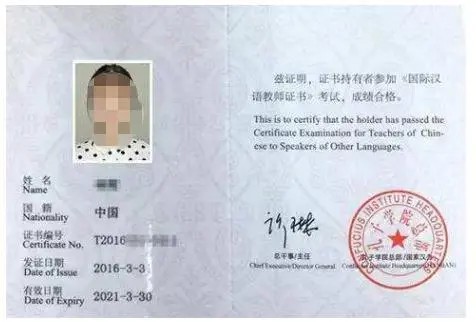 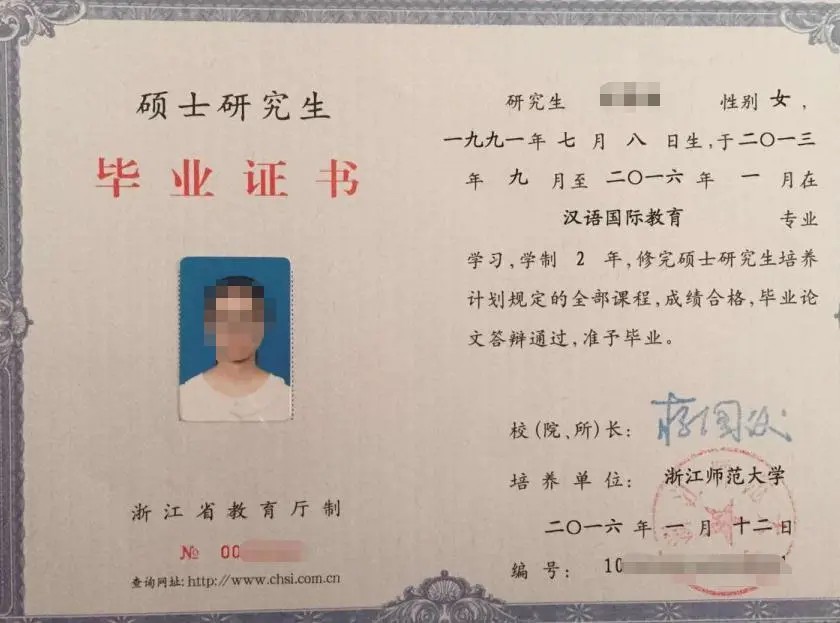 # About us # Founded in 2007 Chinese test and training center 200+ Chinese teachers 5000+ students 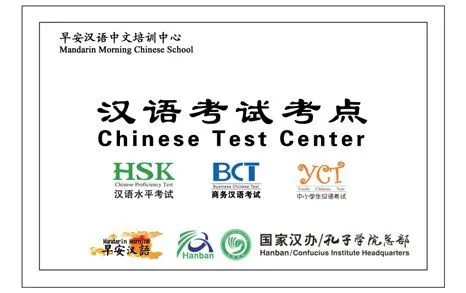 # Contact us# Name:fiona Phone number:021-52287809,13918358891 E-mail:info@mandarinmorning.com www.mandarinmorning.com If you are interested to join Mandarin Morning school or want more details about our services, scan the following QR code. ☟ 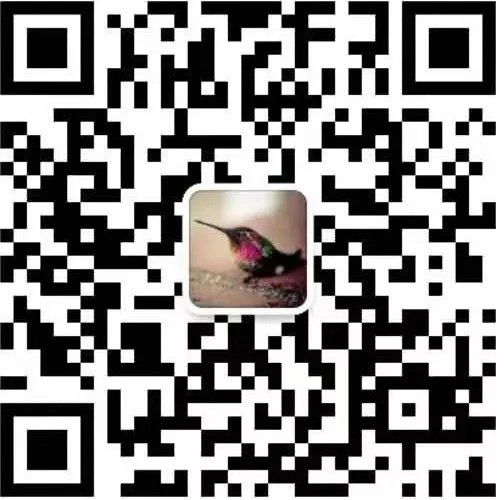 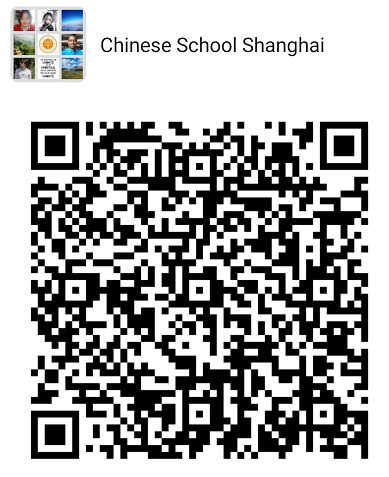 Mandarin Morning Chinese test center attached to Confucius institute headquarters Authorized Test Center and Training Center for International Chinese Language Teacher Certificater 10 years+ ,200 teachers ,more 10000 students,200+companies  |